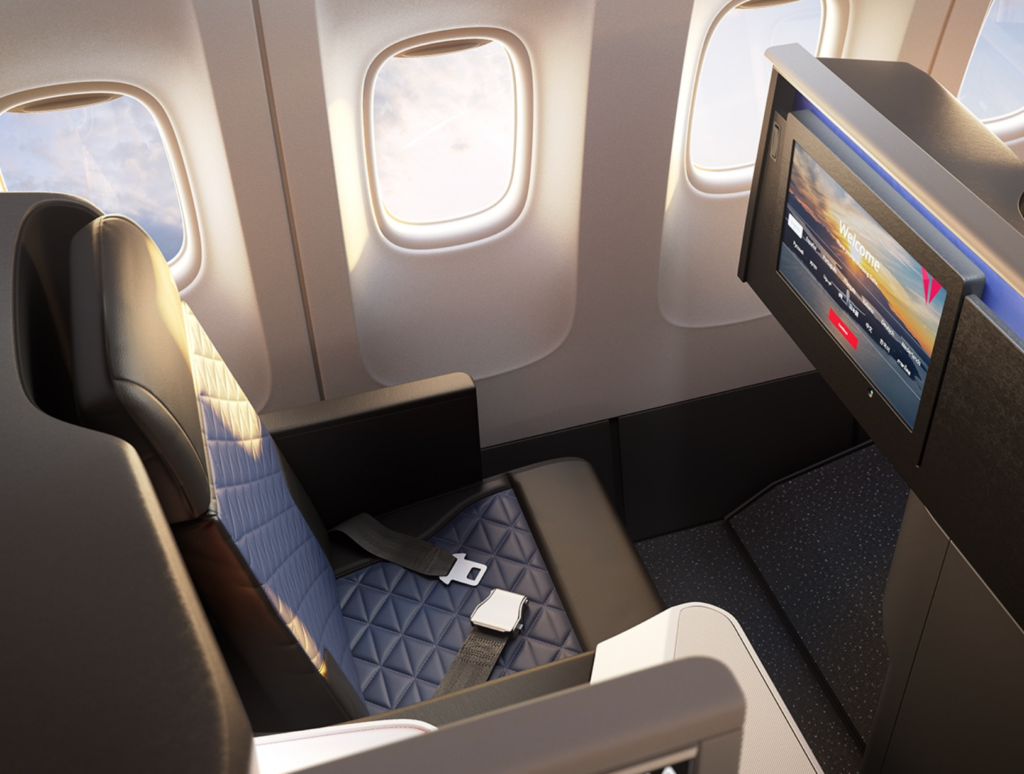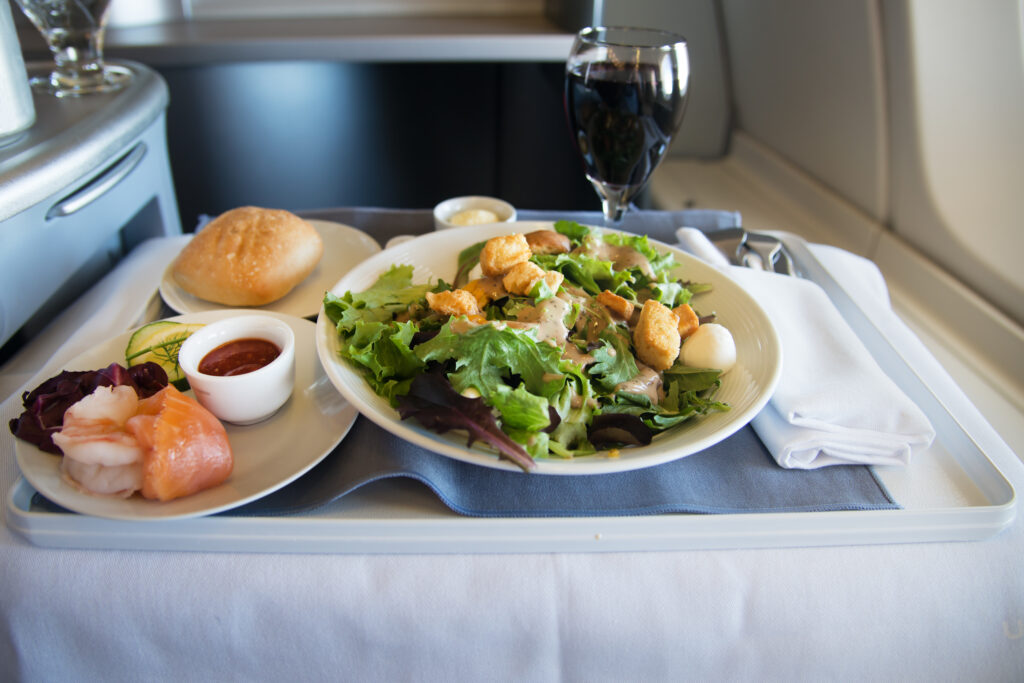Is first class worth the additional cost?
Signing up for credit cards through partner links earns us a commission. Terms apply to the offers listed on this page. Here’s our full advertising policy: How we make money.
The draws of a first-class seat are obvious: extra legroom, more comfortable seats, better on- flight service and more. Of course, all these perks aren’t exactly cheap. Thus, the age-old question arises, is flying first class worth it? Sometimes, it is worth paying the expensive price for a better seat, and sometimes it isn’t. But in all cases, that seat feels so much better when you can pay for it using points and miles!
How expensive is first class?
The price of first class seats varies among airlines, destinations and dates. For longer flights to bigger airport hubs, first class tickets will generally cost more. Booking your ticket further in advance will help you get cheaper fares, and in some cases, you can use a minimal amount of points and miles for a maximum upgrade.
Here’s a general rundown of what you can expect a first-class ticket to cost on top U.S. airlines, gathered by looking at prices of 10 round-trip flights on the same dates to the same destinations across the U.S. on each airline.
Alaska Airlines
The average first class seat on Alaska Airlines will cost between $650 and $1,050 for domestic flights, depending on date and destination, making it the most expensive on the list.
If you’re a part of Alaska’s rewards program or have a credit card that lets you accumulate points and miles for the airline, you can upgrade your seat to first class for 15,000 miles one way. You can also pay to upgrade your seat to first class, anywhere from $29-$199 one way depending on the distance of your flight.
American Airlines
American Airlines have cheaper fares for first class tickets, typically between $500 and $900 for domestic flights, depending on date and destination.
Points and miles can help you secure these fares for no cash value, and Citi ThankYou points will get you the best value per mile on American flights. Depending on your destination and the class you originally booked, a first class upgrade will cost either 15,000 miles or 25,000 miles. To upgrade from all classes besides business, you’ll also have to pay a dollar amount anywhere from $75-$550, depending on your class and destination.
Delta Airlines
Delta’s first class prices fluctuate the most of any airline, and can cost anywhere from $500 to close to $1,700 for domestic flights, depending on date and destination.
Delta also doesn’t have a set dollar amount or set points/miles amount it will cost to upgrade your seat. All upgrades from a lower class to first depend on the flight, the destination, the distance, and availability. While the uncertainty of Delta first class prices can be frustrating at first glance, if you do your research, track prices, and stay committed to searching for the lowest fares, you can find first-class seats for a total steal.

JetBlue
JetBlue’s first-class seats are in a cabin called “Mint” and have some of the lowest prices for first-class amenities. These seats come in at an average of $300-$650 total for domestic flights, the lowest average on the list depending on date and destination. The Mint cabin is only available on JetBlue flights to and from: Boston, NYC, LA, Seattle, San Francisco, San Diego, Las Vegas, Fort Lauderdale, Aruba, St. Lucia, Barbados, St. Maarten, Grenada and Liberia.
Because of the limited number of flights Mint class is offered in, there’s no standard amount to upgrade with points and miles or dollars. If you are considering upgrading to or purchasing a Mint class ticket with points or miles, keep in mind that you can’t use JetBlue’s partner airline miles, like Hawaiian or Emirates, to book Mint class like you can for other classes.
Southwest Airlines
Similar to JetBlue, Southwest doesn’t technically have a first class ticket; their most expensive cabin is called “Business Select”. An average seat on business select is between $550-$700, depending on date and destination.
Upgrading to business select from a lower cabin will typically cost between $35-$55, the lowest dollar amount for an upgrade on the list. However, that’s because you’re mostly buying earlier seat selection, rather than nicer seats on the plane. Points and miles upgrade amounts are not disclosed by Southwest and likely vary from flight to flight.
United Airlines
United Airlines first class will cost between $550-$950 on average for domestic flights, depending on date and destination.
To upgrade from economy to a first-class seat on United, there is a fee of $325, which is sold in 500-mile increments. If you’re a member of United’s frequent flyer program, this fee drops to $200 for 500 miles. For upgrades from all other classes and to upgrade with points or miles, the amount varies for each flight.
Benefits of flying first class
The benefits of flying first class depend on the airline, but you can always expect a few things in a first-class cabin. First-class seats are always more comfortable than lower classes, will have extra legroom, and will typically recline all the way back for you to lie down during your flight. First class seats also come with better dining options than lower classes, and many airlines have partnered with restaurants and chefs to give their first class passengers a premium dining experience. Plus, if you’re flying first class, you’ll be one of the first people to get to board the plane.
Beyond the benefits you get while being on board, many first class tickets also come with services to make your trip easier overall. For example, United’s first class passengers will receive two checked bags for free. Southwest’s business select tickets let travelers access a Fly By lane during security and at the ticket counter, making for less wait time in the airport. Delta first class passengers will receive their bags first at baggage claim. Long story short, no matter what airline you’re flying, having a first class ticket will make traveling easier and more comfortable.

Is flying first class worth it?
If you’re judging just by the dollar amount first class is worth, the answer to this question is likely no. First-class tickets are way more expensive than any lower class. While some perks, like free checked baggage and complimentary drinks, will help offset the cost, it almost never makes up for it entirely.
The real value of first class comes in the services and amenities it offers and is quantified by how much you value those. When you fly first class, you’re flying more comfortably, you’ll be able to be more productive on your flight, you’ll be pampered by flight attendants and overall less stressed traveling. If these are all things you value while traveling, first class is worth it for you. If you’re the kind of person that just wants your flight to get you to your destination and nothing more, don’t spend the money on first class. But if you view flying as an experience, as the mood-setter for the rest of your trip, splurge on first class.
FAQ about flying first class
What’s the difference between first class and business class?
If you view first class as the gold medal of flying, you can view business class as the silver medal. Business class is right behind first class and is available for cheaper, but still pricey, fares. It offers some of the perks and amenities of first class, but by no means all of them.
First-class seats will likely come with your own private space on the plane and maybe even a seat that turns into a bed, while business class seats will just provide extra legroom. First class passengers will get restaurant-level food, while business class passengers will get good-but-not-great meals. On airlines, you get what you pay for, meaning more money will get you more perks, amenities and services.
What’s the difference between first class and economy class?
The differences between first class and economy are the largest and most easily identifiable on the plane. Economy class are the cheapest tickets on the plane, but come with virtually no extras. When you fly economy, your seat will provide minimal legroom and will likely have you sharing an armrest with two strangers. The food in economy will be typical airline meals for longer flights, and on shorter flights you’ll get a complimentary snack like pretzels or peanuts. While it’s definitely not as glamorous, economy prices are low and will get you to the same place at the end of the day.
What’s the difference between flying first class on a domestic flight vs. an international flight?
If you thought domestic first class prices were high, wait until you hear about international first-class prices. These tickets can cost tens of thousands of dollars for just one way, but your flight experience will be beyond luxurious. Flying first class on an international flight means multiple restaurant-quality meals, lots of complimentary alcohol, a comfortable and expansive seat to sleep in away from other passengers and more. International first-class tickets generally get you the same benefits as domestic first class tickets, you’ll just be able to reap them for a longer time and at a more extreme level.
Bottom line
Traveling first class isn’t for everyone. If you just want to get to your destination and don’t care about the extra benefits, definitely don’t spend your money on first class. But if you value convenience, ease, quality and personal space while flying, first class is well worth the extra cost. In some cases, you can avoid the expensive price entirely and use points and miles to get your first class seat. If you do ever make it to the first class cabin, sit back, relax and enjoy the luxury — you deserve it!
Editorial Note: We're the Million Mile Secrets team. And we're proud of our content, opinions and analysis, and of our reader's comments. These haven’t been reviewed, approved or endorsed by any of the airlines, hotels, or credit card issuers which we often write about. And that’s just how we like it! :)






Join the Discussion!